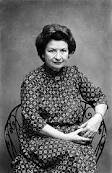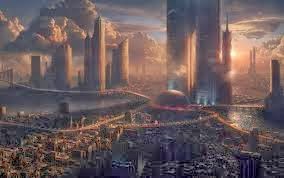Fractured but not divided
I loved V.S. Naipaul's India : a million mutinies now. Naipaul was born and raised in Trinidad, where his grandparents had emigrated from India in the 1880's as labourers. Naipaul had several extended stays in the country of his ancestors, most notably in the 1960's. In the 1990's he returned to India for a long stay revisiting several places that he had first been to in the '60's; as well as going to new areas, and reflecting on the massive changes that had taken place in the subcontinent since his earlier visits.
I always enjoy anything to do with India. My family had connections there. My great-uncle worked throughout India for over 30 years, and my father was based there during the Second World War. Both men loved the country and its people. India : a million mutinies now was a complete delight, not least because Naipaul is in the unusual position of being both an in- and outsider. He is also a Nobel prize winning author, and the language of the book is beautiful. It is the third book in a travelogue sequence about India, its history and its peoples preceded by An area of darkness and India : A wounded civilization. I haven't read either of these earlier books, and you don't need to, in order to be able to appreciate the last book in the trilogy.
Naipaul reflects on the effect of invasion on the culture of India - first the big Mughal invasions of the 16th century, followed by the British in India. Naipaul shows that India with its patchwork of races, languages and cultures remained resolutely "Indian" despite repeated invasions. Naipaul is, I think, somewhat controversial, when looking at the British presence. There is a certain sense in which he appears to be suggesting that life was better under the British. It may be true that there were enormous technological advances under the British (not surprising as they were at the forefront of the Industrial Revolution, and the conquest of India largely coincided with this); but whether Imperialism can ever be said to be a "good" thing, I remain unconvinced.
Where I do find Naipaul really interesting though is in his depiction of the Indian mutiny, and its effects on India post-Empire. Naipaul makes it clear that India was not united at the time of the mutiny, and that post-independence it remains a fractured society though electoral emancipation has had a huge effect on Indian life, and the caste system is starting to break down. There is still a wide margin between the Haves and Have-Nots of Indian Society. Religion and culture continues to keep many Indians apart, while society can make for some unusual bed-fellows (who would have thought that Dalits (formerly known as Untouchables) might have more in common with Muslims than with their fellow Hindus, for example)? Often Indians will see their community as being the family, closely followed by the area in which they live, and their religious / cultural fellows within that community. Politics also plays a role but a Communist (for example) in Calcutta may still have more in common with his religious community than his political peers.
The fractured nature of Indian society becomes very clear when looking at some of the events that preceded and surrounded Naipaul's visit in the '90's, as many communities turned away from their sense of being a community within India, looking instead at the possibilities that might open up for their own community, whether based on race, religion or caste. This sense of fracturedness permeated Indian life from the Tamils and Muslims that Naipaul met, to members of particular states or jobs. Naipaul is positive about this though. It might look as though it is spelling the beginning of the end for such a vast country, but the message that comes through Naipaul's book is that India survives despite the many changes within the country and the swathe of communities, often very different, that inhabit it. In a sense it survives because of its diversity, and it is the exuberant country that it is because of it.
That India had changed rapidly since Naipaul's earlier visit is indisputable. It would be interesting to know if a follow-up volume is planned, as I'm sure that the changes since the '90's would be even more obvious. As a travel writer Naipaul is in a class of his own. His long journeys to every corner of India from Portugese influenced Cochin to the uneasy playground of Kashmir, from busy Calcutta to booming Bombay (no Mumbai yet) makes you long to visit this fractured, frustrating, beautiful country with its wonderful history and melting-pot of cultures and cuisines. Influential and stimulating, this is a must-read for anyone who is a lover of India.
I always enjoy anything to do with India. My family had connections there. My great-uncle worked throughout India for over 30 years, and my father was based there during the Second World War. Both men loved the country and its people. India : a million mutinies now was a complete delight, not least because Naipaul is in the unusual position of being both an in- and outsider. He is also a Nobel prize winning author, and the language of the book is beautiful. It is the third book in a travelogue sequence about India, its history and its peoples preceded by An area of darkness and India : A wounded civilization. I haven't read either of these earlier books, and you don't need to, in order to be able to appreciate the last book in the trilogy.
Naipaul reflects on the effect of invasion on the culture of India - first the big Mughal invasions of the 16th century, followed by the British in India. Naipaul shows that India with its patchwork of races, languages and cultures remained resolutely "Indian" despite repeated invasions. Naipaul is, I think, somewhat controversial, when looking at the British presence. There is a certain sense in which he appears to be suggesting that life was better under the British. It may be true that there were enormous technological advances under the British (not surprising as they were at the forefront of the Industrial Revolution, and the conquest of India largely coincided with this); but whether Imperialism can ever be said to be a "good" thing, I remain unconvinced.
Where I do find Naipaul really interesting though is in his depiction of the Indian mutiny, and its effects on India post-Empire. Naipaul makes it clear that India was not united at the time of the mutiny, and that post-independence it remains a fractured society though electoral emancipation has had a huge effect on Indian life, and the caste system is starting to break down. There is still a wide margin between the Haves and Have-Nots of Indian Society. Religion and culture continues to keep many Indians apart, while society can make for some unusual bed-fellows (who would have thought that Dalits (formerly known as Untouchables) might have more in common with Muslims than with their fellow Hindus, for example)? Often Indians will see their community as being the family, closely followed by the area in which they live, and their religious / cultural fellows within that community. Politics also plays a role but a Communist (for example) in Calcutta may still have more in common with his religious community than his political peers.
The fractured nature of Indian society becomes very clear when looking at some of the events that preceded and surrounded Naipaul's visit in the '90's, as many communities turned away from their sense of being a community within India, looking instead at the possibilities that might open up for their own community, whether based on race, religion or caste. This sense of fracturedness permeated Indian life from the Tamils and Muslims that Naipaul met, to members of particular states or jobs. Naipaul is positive about this though. It might look as though it is spelling the beginning of the end for such a vast country, but the message that comes through Naipaul's book is that India survives despite the many changes within the country and the swathe of communities, often very different, that inhabit it. In a sense it survives because of its diversity, and it is the exuberant country that it is because of it.
That India had changed rapidly since Naipaul's earlier visit is indisputable. It would be interesting to know if a follow-up volume is planned, as I'm sure that the changes since the '90's would be even more obvious. As a travel writer Naipaul is in a class of his own. His long journeys to every corner of India from Portugese influenced Cochin to the uneasy playground of Kashmir, from busy Calcutta to booming Bombay (no Mumbai yet) makes you long to visit this fractured, frustrating, beautiful country with its wonderful history and melting-pot of cultures and cuisines. Influential and stimulating, this is a must-read for anyone who is a lover of India.






.jpeg)



Comments